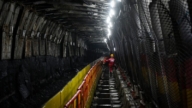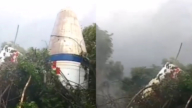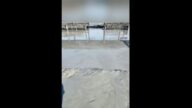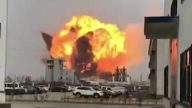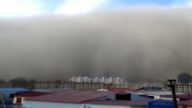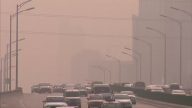【新唐人2013年02月18日訊】山東濰坊等地的企業用高壓水井把污水壓到地下,導致水污染。相關政府監管部門至今仍然保持沉默。當地民眾強烈譴責地方政府和無良企業。然而,更有網友爆料,濰坊當局一方面在北京疏通中央,企圖下發封口令,阻止地下污水醜聞進一步曝光,另一方面扣留了當地的40多人,包括記者在內。下面請看本臺記者的報導。
中國大陸的環境污染已經從地面,天空,再滲透到地下。日前,公益人士鄧飛在微博爆料指稱,山東濰坊的化工廠和造紙廠,將致命性的污水通過高壓水井壓到地下,逃避監管。而地下排污法已在很多地方悄悄進行多年。
這一消息引起網友們的關注紛紛轉發,並譴責官商勾結,和這種「斷子絕孫」的無恥行徑,讓諸多同胞成了地下水污染的「難民」。
不過,監管部門至今沒有作出任何回應,甚至連一句慣用的「正在調查」也沒有。有網友質疑,在民眾頻頻舉報,媒體屢屢曝光的情況下,地方政府和環保、安監部門在檢查中不可能沒看出貓膩,唯一的解釋是「睜眼瞎」。
環保自願者、民間水專家張俊峰:「地方一些追求經濟的官員 和企業之間互相串通在一起,或者互相配合,作出這種欺上瞞下的情況。使得這個企業依舊能夠正常的生產、依舊能夠正常的納稅、依舊可以給當地的地方帶來一定的收益。但是他們卻不顧及由此帶來的這種危害,對別人的危害,對後代的危害。」
2月16號晚,鄧飛在微博上發佈了一個更令人寒心的消息,他說,山東濰坊政府採取雙管齊下的方式應對危機:一方面派人到北京疏通關係,企圖封殺地下污水醜聞,另一方面在當地還扣留了包括記者在內的40多人。
環保自願者、民間水專家張俊峰:「地方政府為了自己的經濟利益,不惜動用公權力,對這種監督行為對這種舉報行為進行非常殘酷的一種打壓。他們是不允許有這種不同意見來發表出來。
實際上,「污水直排地下」並不是新聞。早在2010年5月,大陸《半月談》時政黨刊就發出「地下排污:致命威脅悄悄逼近」的警報。雜誌直指污染企業除了挖滲坑、滲井偷排污水外,有的還用高壓泵將大量污水直接注入地下。南方的一些企業甚至將污水排入地下溶洞。
雖然雜誌報導在當時激起一時的輿論波瀾,卻在當局「化骨綿掌」的應對下銷聲匿跡。然而地下排污不僅沒有得到有效遏制,還引發了更多的惡性環境污染事件,和各地民眾抵制污染企業的群體性事件。今年大年初一,江西上饒玉山縣雙元村就有上千村民舉行示威,抗議當地「三清化工廠」污染水土和空氣。
山東煙臺居民張先生:「他們作為執法部門,根本就不作為。像這種情況下,想制止的話應該是很難的。說是山東這,中國各地都是一樣。這些部門現在已經基本上已經形成一種利益交換,利益共享的這種格局。就是說花一點錢,然後擺平了,你們都走吧,反正我該污染還是污染我的。基本上就形成了這種行政不作為。」
四川成都的維權人士黃琦對《自由亞洲電臺》表示,水土是農民賴以生存的命根子,當局在污染問題上官商勾結,包庇污染企業,在環保數據上作假,造成了官逼民反的局面。
中國水資源總量的1/3是地下水。中國地質調查局的專家在國際地下水論壇的發言中曾提到,中國90%的地下水遭受了不同程度的污染,其中60%污染嚴重。
據《新華網》報導,對118個城市連續監測的數據顯示,約有64%的城市地下水遭受嚴重污染,33%的地下水受到輕度污染,基本清潔的城市地下水只有3%。
採訪/易如 編輯/李明飛 後製/陳建銘
Communist Regime Ignores Water Pollution and Hurts Generations to Come
Industrial waste water in Weifang, Shandong Province,
which has been released through high-pressure wells, has caused ground water pollution.
The regulatory authorities have remained silent
despite people’s complaints.
Recently, Weifang officials were said to have kept
the scandal from further exposure by working through
Beijing and detaining more than 40 locals and journalists.
The following is our report.
Environmental pollution in China has covered the land,
the sky, and even penetrated the deep ground.
Recently, environmentalist Deng Fei broke the news
via microblogging that chemical plants and paper mills
in Weifang, Shandong, have avoided regulation
by discharging fatal sewage through high-pressure wells to the underground.
This underground disposal method has been conducted
for years in many places.
This information was re-posted by many netizens.
People condemned this collusion between government
and business as shameless, and believe it has turned many citizens into the victims of groundwater pollution.
However, the regulatory authorities have not made
a statement, not even the usual “it’s under investigation."
Some netizens believed the government, the regulatory
and safety departments have kept their eyes closed
on pollution issues even though there have been
so many exposures by individuals and media.
Environmentalist and water expert Zhang Junfeng: “This
is a collusion between local officials and business in the name of economy.
The business continues to produce products and
taxes for the locals.
However, it’s at the cost of people’s lives and
generations to come.”
On the evening of February 16, Deng Fei released
a chilling message on his microblog.
The Weifang government took a two-step approach
to deal with the pollution news.
They sent people to Beijing to clear the underground sewage
scandal, and detained more than 40 locals and reporters.
Zhang Junfeng: “The local governments brutally
suppressed people’s rights to supervise and impeach. No different opinions are permitted."
In fact, the direct discharge of sewage underground
is not news.
As early as May 2010, the regime’s mouthpiece,
Banyuetan magazine, warned the underground sewage threat and that it was quietly killing.
The magazine pointed out that the industries have been
releasing wastewater by digging seepage pits and seepage wells and using high-pressure pumps.
Some businesses in the south even discharged
sewage into the underground cave.
That report provoked momentary criticism
which was later erased.
Underground sewage has not been effectively curbed,
but has triggered a series of vicious environmental pollution incidents and protests.
On this Chinese New Year’s Day, thousands of villagers
from Shuangyuan Village, Jiangxi,
protested against the local pollution of land,
water and air by Sanqing chemical plant.
Mr. Zhang, a resident of Yantai, Shandong:
“The law enforcement agencies simply do not function.
It is hard to stop the pollution.
It is the same everywhere in China.
These departments only care about money.
With some money, no trouble will be attached.
The pollution will continue.
There is no governing."
Human rights activist Huang Qi of Chengdu, Sichuan,
told Radio Free Asia that farmers rely on the land and water.
The collusion between government officials and business
has left the pollution problems untouched and caused falsification of environmental research.
People are thus forced to rebel.
Groundwater occupies one third of the total water resources
in China.
In the International Groundwater Forum, China Geological
Survey revealed that 90% of China’s groundwater suffered pollution of various degrees.
60% of the polluted water is considered heavily polluted.
Xinhua News Agency reported that of 118 cities that monitor
underground water, about 64% percent of urban groundwater
is heavily polluted, 33% of groundwater has mild contamination,
and only 3% of urban groundwater is considered clean.


